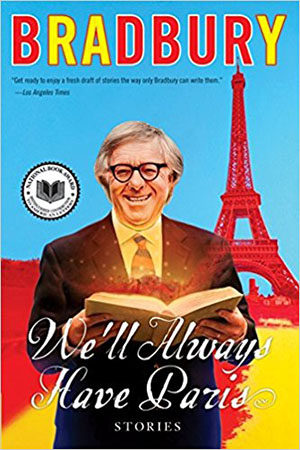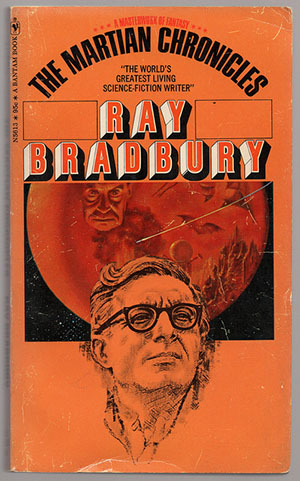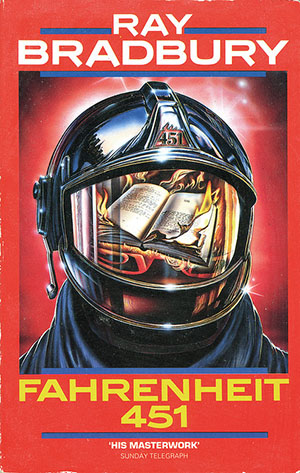RAY BRADBURY: AN OPTIMISTIC IDEA MAN WHO SAW THE FUTURE
PCC’s Vintage Interview with the Great Science-Fiction Writer
By Paul Freeman [1997 Interview]
For more than half a century, Ray Bradbury propelled wide-eyed readers into the future. So it seems appropriate that he was the first speaker in the “Tales From The Final Frontier” series launched by San Jose's Tech Museum of Innovation in 1997. We were fortunate enough to have a brief chat with Mr. Bradbury on the eve of his appearance there.
More than 500 of his works have been published, including short stories, novels, plays, screenplays, television scripts and verse. At that time, his latest publication was a collection of short stories, "Quicker Than The Eye.” It covers diverse subjects and shows off Bradbury's remarkable agility in dealing with everything from fantasy and futuristic landscapes to down-to-Earth themes such as racism, censorship and war. He was a master at raising social and political issues in ways that inspire readers to think for themselves.
Mr. Bradbury passed into the next dimension in 2012, at age 91. But his imaginative works will live on for untold centuries. Among his classic tales are “Fahrenheit 451,” “I Sing The Body Electric,” “The Martian Chronicles” and “The Illustrated Man.”
POP CULTURE CLASSICS:
You’re coming up to the Bay Area to speak at the San Jose Tech Museum of Innovation. What will be the focal point of your talk?
RAY BRADBURY:
I haven’t got the faintest idea. [Laughs]
PCC:
The whole idea of innovation, do we still have the same sort viewpoint about that, as a society? Are we as innovative as we once were?
BRADBURY:
Even more so. When you think of what’s happened in the computer field alone in the last 12 years, 15 years, it’s amazing. And when you look at the record of Mr. Gates, the whole internet thing. And then in motion pictures, the development of special effects, where our brains haven’t caught up with the effects, of course. And then your virtual realists - I’ve been writing about this sort of thing for 45 years.
So we’re very innovative. And, after all, we’ve gone to the moon. We’ve sent our photography to Mars. We’re going back out into space. We’ve got the shuttle working. It’s amazing what has happened. We’re very innovative.
PCC:
For you as a writer, has technology helped, the software available…
BRADBURY:
Oh, not a bit. Not a bit. Creativity is inside each of us. It has nothing to do with your exterior circumstances.
PCC:
As far as the future we envisioned in the 50s and 60s, the flying vehicles and that sort of thing, is it disappointing that we haven’t gone further than we have?
BRADBURY:
We should be on the moon right now, of course, yeah. I’m sorry that we didn't stay there. But we've got to go back and then we've got to go from there to Mars. I hope that will happen in the very near future."
PCC:
“Quicker Than The Eye,” there’s such diversity there. Is that something you’re conscious of, as you’re writing?
BRADBURY:
Never. You should never know what you’re doing. You do it.
PCC:
So creativity, is it something that needs to be sparked in some way?
BRADBURY:
No, it’s inside of you and just comes out of you — for its own reasons. "I wake up every morning and there's a new idea there and it says, “I'm next! Write me!” So I write it. I never know what I'm going to do from day to day.
PCC:
Have you never encountered a dry spell?
BRADBURY:
Never, because if you write what you love, you never have a dry spell. The people who have roadblocks, or mind blocks, are the people who do things they shouldn’t be doing — people who take screenplays they shouldn’t write… or write books they shouldn’t write. Well then, they’re going to wind up with dry spells, because their subconscious says, “I’m going to cut off the waterworks.”
PCC:
This amazing imagination, do you credit it somewhat to upbringing or genetics or just the way you look at life?
BRADBURY:
Genetics, yeah. I think you’re born with certain talents. And if you’re smart, you use them. And if you’re not smart, you don’t. It’s just that simple.
PCC:
But over the years, have you found ways of enhancing the creative mood?
BRADBURY:
No. Just as long as you go to the library… and stay there… and read… and write. Write every day of your life. Read every day of your life. Keep the juices flowing. Inhabit the book stores. Inhabit the libraries. And then you have a good life.
PCC:
What’s next for you?
BRADBURY:
I’m working on a few screenplays - one for Mel Gibson. We’re doing the “Fahrenheit 451” over again, as a new film. And I’m working on “The Wonderful Ice Cream Suit,” a story of my life with the Mexican-Americans in downtown Los Angeles, years ago. We’re doing that with the Disney company. I did it on the stage a few years ago with a score by Jose Feliciano, a musical. And I’m working on “The Martian Chronicles” for Universal and some of Spielberg’s associates. So it’s going to be quite an interesting year.
PCC:
Generally, have you been happy with the adaptations that have been filmed?
BRADBURY:
Well, it varies from film to film. “Something Wicked This Way Comes” was a very good film. Not perfect, but damn good. “Illustrated Man” was a disaster. It had nothing to do with my story. And I did it over again, most of it, on my own TV series, “The Ray Bradbury Theatre.” “Martian Chronicles,” when it was on NBC as a six-hour special, 18 years, was mainly boring. It wasn’t bad. It was just boring. So I’m doing it over as a major film now.
PCC:
And “Fahrenheit,” what would you like the new film version to be, that the previous attempt was not?
BRADBURY:
We will do the book, the whole book. And not leave things out. Truffaut left a lot of things out.
PCC:
Do you sense another resurgence of interest in science-fiction coming?
BRADBURY:
No, no, it’s here. It’s been here constantly, the last 20 years. Spielberg and Lucas got it all started and it’s never stopped. All the important films that have made a lot of money — if you want to look at money as a way of examining films — have been science-fiction, starting with “Close Encounters of the Third Kind”.,.. and then all of Spielberg’s films since — most of them science-fiction. And Lucas, the “Star Wars” series — fantastically successful. The “Star Trek,” on TV. Things like “Get Smart.” A lot of TV shows are science-fiction. But they don’t have the label, that’s all.
PCC:
But with another “Star Wars” series on the way, do you think that will accelerate the whole thing even more?
BRADBURY:
No, no. It’s already accelerated. [Chuckles]. We got “Independence Day” during he last year. And that made more money than any other film in history. It wasn’t very good. But it made a lot of money.
PCC:
Do you think most of the genre efforts these days are as attuned to providing something beyond entertainment, trying to enlighten, as well?
BRADBURY:
No, you shouldn’t do that. The enlightenment should be part of the story. “The Martian Chronicles” is an interesting book, because it’s both intellectual and entertaining. But it didn’t start out to be intellectual. You either have the smarts in you, when you write as story, or you don’t. But you can’t force it.
PCC:
Looking ahead now, are you optimistic about the future?
BRADBURY:
Well, why shouldn’t we be? We’ve done everything that we set out to do. We’re still the most important country in the world. We still have 400,000 immigrants coming in here every year. And we’ve done that for 80 years now. I mean, that’s very optimistic.
PCC:
And hopefully people in this country and all over the world will have the opportunity to explore new Ray Bradbury stories for many years to come.
BRADBURY:
Thank you.
- click to go back to top of page -
| 


